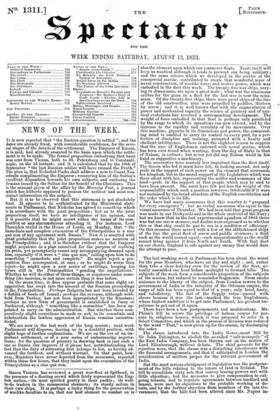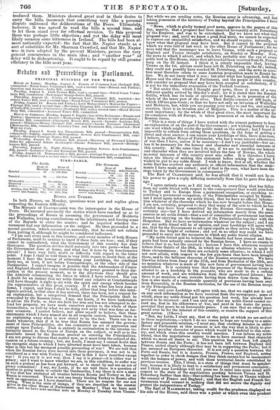The last working week in Parliament has been about the
worst for the poor Members, who have sat day and night ; and, rather than take a clear holyday even for the review of the fleet, ac- tually assembled one hour before midnight to forward bills. The subjects of the week form a considerable proportion of the subjects of the session, but reduced to remainder fragments. From smoke nuisance to the liberty of the subject, from London sewers to the government of India or the integrity of the Ottoman empire, the range of talk has been equal to that of a year; only brief, hasty, and valedictory. The last of the Supply votes—passed with cheers because it was the last—marked the true Englishman, whose highest ambition is to get into Parliament, his greatest im- patience to get out of it again.
There have been a few postponements and modifications. Mr. Phinn's bill to secure the privilege of habeas corpus for per- sons in religious houses, which it was proposed to refer to a Select Committee, and which in the process of division was reduced to the word " That," is now given up for the season, by discharging the order.
The clause introduced into the India Government Bill by Sir John Pakington, to abolish the so-called " salt-monopoly" of the East India Company, has been thrown out on the motion of Lord Ellenborough, without debate. The chief grounds for the rejection were, that the clause was a disturbing interference with the financial arrangements, and that it anticipated in London the consideration of matters proper for the internal government of India.
But the most serious abridgment of legislation was the postpone- ment of the bills relating to the tenure of land in Ireland. The bill, to consolidate sixty acts that convey leasing-powers met with little objection; but the measures to give compensation to out- going tenants, and to regulate, agreements between landlord and tenant, were met by objections to the probable working of de- tails, and by the further objection from members of the late Go- vernment, that the bills been altered fano Mr. Napier
troduced them. Ministers showed great zeal in their desire to carry the bills, insomuch that something very like a personal dispute enlivened the deliberations of the Peers. Ultimately, however, it was agreed to read the bills a second time, and to let them stand over for effectual revision. To this proposal there was perhaps little objection; and yet the delay will most likely occasion some bitterness in Ireland. The bills had been al- most nationally expected: the fact that Mr. Napier stands as a sort of substitute for Mr. Sharman Crawford, and that Mr. Napier was in turn adopted by the present Ministers, proves the very general concurrence in the main idea ; and " another year " of delay will be disheartening. It ought to be repaid by still greater efficiency in the bills next year.



























 Previous page
Previous page